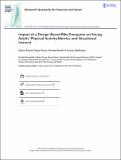Impact of a design-based bike exergame on young adults' physical activity metrics and situational interest

Type de référence
Date
2020-02Langue de la référence
AnglaisEntité(s) de recherche
Résumé
Purpose: Despite the benefits of commercial exergames, in the practical application, players might not be spending sufficient time in physical activity levels compatible with health outcomes. We adopted a design-based exergame approach to build a bike exergame called Greedy Rabbit. The purpose of this study was to identify the impact of Greedy Rabbit on players’ physical activity metrics and situational interest. Method: Sixty undergraduate students were assigned to two groups: an experimental group playing Greedy Rabbit (N = 41) and a control group playing a placebo version of Greedy Rabbit (N = 19). The physical activity metrics measured were maximum oxygen consumption, heart rate and cadence. Results: The experimental group reported higher scores for all physical activity metrics and for two dimensions of situational interest (instant enjoyment and attention demand). Furthermore, the physical activity metrics increased more during the exergame for the experimental group, reaching the standard guidelines for vigorous physical activity. Conclusion: This study demonstrated that a design-based bike exergame might be a good option to enhance players’ health-related physical activity outcomes and situational interest.Titre du périodique
Research Quarterly for Exercise and SportMaison d’édition
RoutledgePays d'édition
Etats-Unisp-ISSN
0270-1367e-ISSN
2168-3824Evaluation par les pairs (peer reviewing)
ouiPortée nationale / internationale
internationaleVolume / tome
91 (2)Pagination
309-315Public(s) cible(s)
Chercheursprofessionels du domaine
Etudiants
URL permanente ORFEE
http://hdl.handle.net/20.500.12162/3298Autre(s) URL(s) permanente(s)
http://doi.org/10.1080/02701367.2019.1665621Document(s) associé(s) à la référence
Texte intégral :
Fichier
Accès
Commentaire
Version
Taille
Sur demande
postprint éditeur
779.0ko
- Tout ORFEE
- Détail référence



